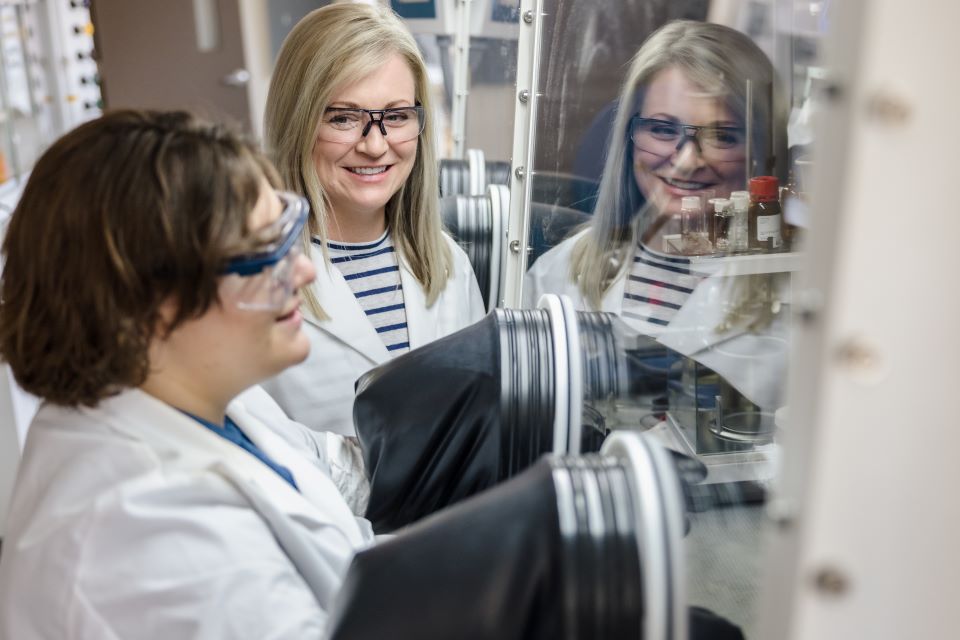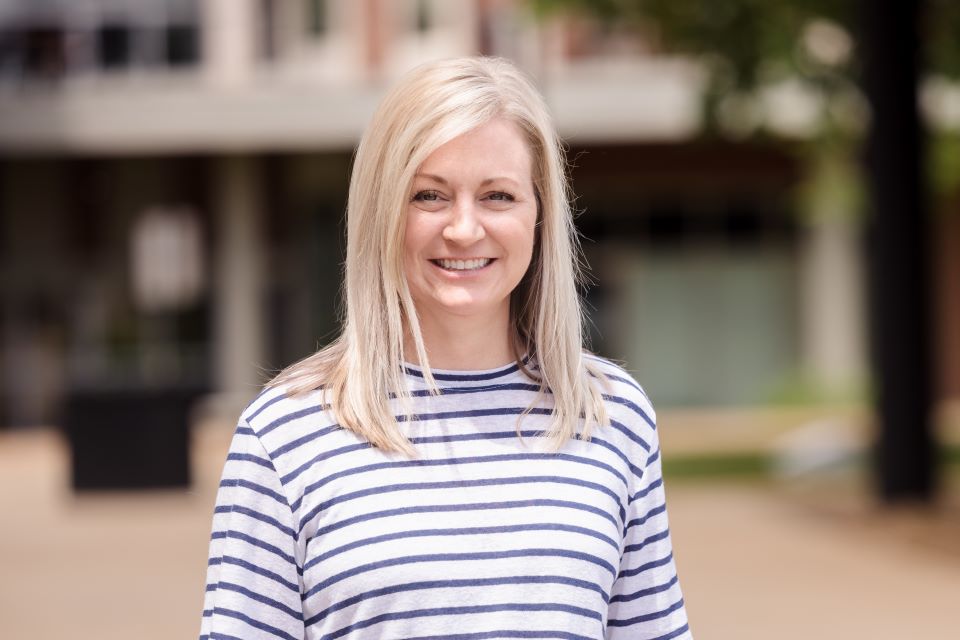NSF Grant Will Accelerate SLU Researcher’s Work in Sustainable Metals
ST. LOUIS – A $500,000 grant from the National Science Foundation will accelerate research on using sustainable metals, specifically iron, to access valuable molecules.

Jamie Neely, Ph.D., right, watches as student Lily Adams, left, works in a nitrogen-filled glovebox that allows the handling of air-sensitive materials. Photo by Sarah Conroy.
The three-year grant, “Iron-Catalyzed Three-Component Coupling Methods via Iron Azametallacyclobutene Complexes,” was awarded to Jamie Neely, Ph.D., assistant professor of chemistry at Saint Louis University.
Neely is researching new approaches to preparing products valuable to medicine, agriculture, and chemical synthesis through iron-catalyzed three-component coupling chemistry. Specifically, she is seeking to use iron, to make chemical reactions in the creation of pharmaceuticals more sustainable.
“Iron is the most abundant transition metal on Earth,” Neely said. “It is cheap and non-toxic and so is an excellent choice when making pharmaceutical drugs and other important products.”
Synthetic drug targets that could benefit from this chemistry include Nilotinib, which is used to treat chronic myelogenous leukemia, and Abemaciclib, which acts as a CDK inhibitor in treating metastatic breast cancers.
“We are on the road,” Neely said of using sustainable metals in pharmaceutical synthesis. “We aren’t there yet, but the car has left the driveway.”
These iron complexes can interact with coupling partners in a controlled fashion, making them ideal catalysts for the targeted methods. Neely said the project will showcase how the distinct behavior of Earth-abundant first-row transition metals can be seen as an opportunity, rather than a liability.
This research aims to develop iron-catalyzed three-component coupling reactions of nitrene precursors, alkynes, and nitrile or isonitrile substrates to synthesize value-added, nitrogen-containing compounds. Reactions of nitrile coupling partners will provide a route to imidazoles, a pervasive structural motif in biologically active compounds, with further application to the preparation of diversely substituted N-heterocyclic carbenes.

Jamie Neely, Ph.D., is an assistant professor of chemistry at Saint Louis University. Photo by Sarah Conroy.
Iron-catalyzed coupling using isonitrile substrates will access imidoyl ketenimine products that have broad utility as synthetic intermediates.
“We take advantage of iron imide complexes that deliver nitrogen groups and allow access to structures that are common in pharmaceutical drugs,” Neely said.
The metals currently used in the synthesis of these compounds come from scarce sources and can be toxic to humans.
“We’re spending all this time and energy getting residual metals out of the drug products at the end of the reactions,” she said. “If we can make these products with iron, it would minimize toxicity risks and save a lot of effort and money.”
Neely said the grant funding would accelerate her work, allowing research in her lab to proceed more efficiently.
“This grant gives us access to things we didn’t have before, like materials that we were previously synthesizing ourselves in the lab,” she said. “Now we can really focus our efforts on developing this exciting chemistry.”
National Science Foundation
The National Science Foundation (NSF) is an independent federal agency created by Congress in 1950 to promote the progress of science; to advance the national health, prosperity, and welfare; and to secure the national defense. With an annual budget of $8.8 billion, the NSF is the funding source for approximately 27% of the total federal budget for basic research conducted at U.S. colleges and universities. In many fields such as mathematics, computer science and the social sciences, NSF is the major source of federal backing.
Saint Louis University
Founded in 1818, Saint Louis University is one of the nation’s oldest and most prestigious Catholic institutions. Rooted in Jesuit values and its pioneering history as the first university west of the Mississippi River, SLU offers more than 13,500 students a rigorous, transformative education of the whole person. At the core of the University’s diverse community of scholars is SLU’s service-focused mission, which challenges and prepares students to make the world a better, more just place.
Latest Newslink
- Lawrence F. Barmann, Ph.D.: 1932-2025Lawrence Francis Barmann, Ph.D., emeritus professor of American Studies, died April 25, 2025. He was 92.
- Patricia L. Monteleone, M.D.: 1935-2025Patricia L. Monteleone, M.D., dean emerita of the Saint Louis University School of Medicine, died Sunday, May 4, 2025. She was 89. A true trailblazer, Monteleone was the first female dean of Saint Louis University School of Medicine.
- SLU to Serve as Regional Summit Hub Host Site in National Event Around Health Care Workforce ReadinessOn Wednesday, May 21, the Saint Louis University Interprofessional Education Program, the Doisy College of Health Sciences, will host the fifth annual Regional Summit sponsored by the Association of Schools Advancing Health Professions.
- SLU Professors Recognized at 2025 St. Louis Theater Circle AwardsTwo Saint Louis University Theatre and Dance faculty members brought home awards at the 2025 St. Louis Theatre Circle Awards. Nancy Bell, professor of theatre, was awarded Outstanding Director of a Comedy for "As You Like It". The show also received Outstanding Production of a Comedy. Lucy Cashion, associate professor of theatre, directed "Romanov Family Yard Sale," which received Outstanding Ensemble in a Comedy.
- Saint Louis University's New Venture Accelerator Names Second CohortSaint Louis University's New Venture Accelerator (NVA), launched in 2024 out of the Chaifetz Center for Entrepreneurship, announces its second cohort of participants. The NVA offers current SLU students and alumni who have graduated within the last five years equity-free investments of up to $50,000 through a special accelerator fund created through donor support. In addition to financial support, the teams receive additional resources and mentoring from SLU experts.
- Saint Louis University Students in Kenya, Malawi Embrace Opportunity to Be Part of University CommunityThe Saint Louis University-Jesuit Worldwide Learning program offers bachelor's degrees to international students displaced by conflict, lack of opportunity, and poverty in places such as refugee camps in Kenya and Malawi.













